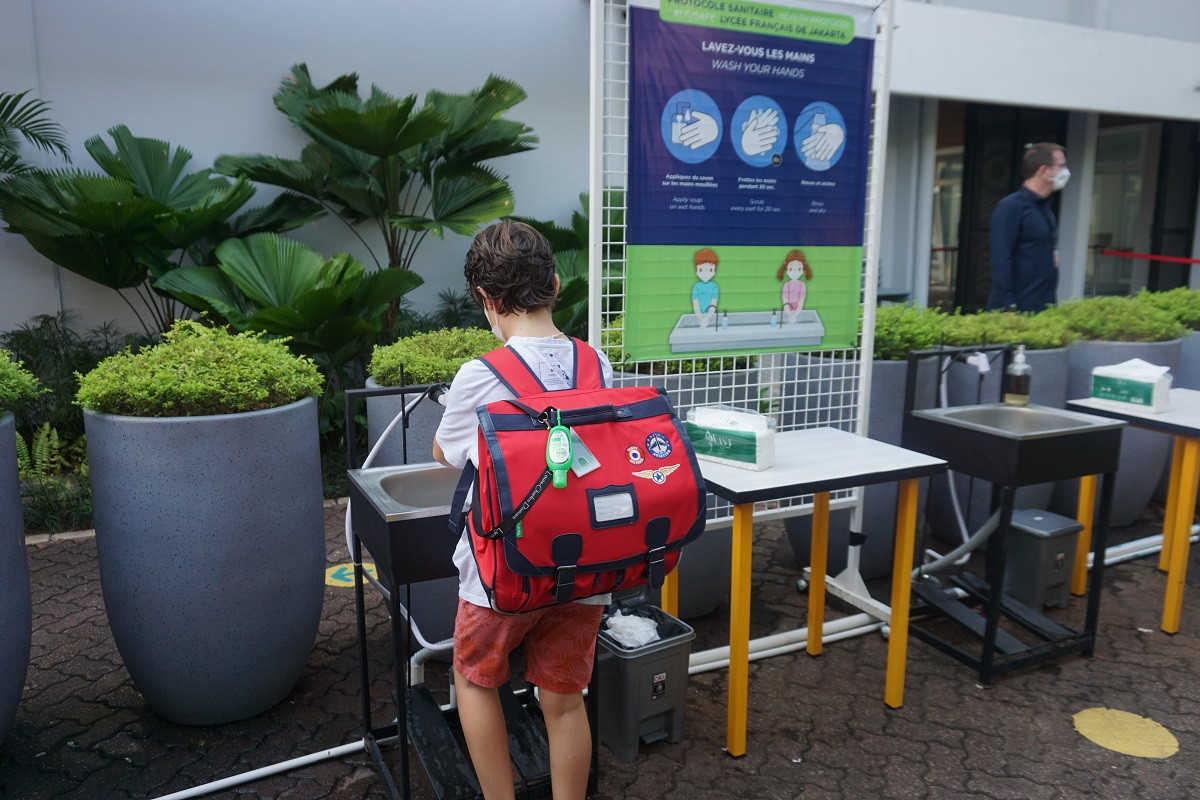Popular Reads
Top Results
Can't find what you're looking for?
View all search resultsPopular Reads
Top Results
Can't find what you're looking for?
View all search resultsCurbs are not enough
Over the past few months, a combination of mass vaccinations and mobility curbs appears to have helped Indonesia contain the pandemic.
Change text size
Gift Premium Articles
to Anyone
 A student washes his hands prior to entering the Lycée Français de Jakarta campus in Cipete, South Jakarta, on Friday, May 28. Lycée Français de Jakarta was one of the first schools in the capital to be approved to pilot in-class learning in April, after undergoing a thorough screening process from the Jakarta Education Agency since October last year. (JP/ Dio Suhenda)
A student washes his hands prior to entering the Lycée Français de Jakarta campus in Cipete, South Jakarta, on Friday, May 28. Lycée Français de Jakarta was one of the first schools in the capital to be approved to pilot in-class learning in April, after undergoing a thorough screening process from the Jakarta Education Agency since October last year. (JP/ Dio Suhenda)
S
marting from past mistakes, the government is considering stringent mobility restrictions ahead of the year-end holiday season to prevent another spike in COVID-19 infection. The Delta variant-fueled second wave of the coronavirus hit Indonesia hard, pushing the country’s public health to near-paralysis and putting the government’s international reputation on the line.
At the peak of the second wave in July of this year, the single-day case rate exceeded 56,000, among the highest in the world at the time. The government shared the blame for inconsistencies in its COVID-19 response that created room for people to break the rules.
Thousands of holiday revelers went on an exodus in May despite an intercity travel ban, only to trigger the escalation of virus transmission not only in Java and Bali, the epicenters of the pandemic, but also in regions where the infection rate had previously been low. In fact, the Delta variant was transmitted much faster than the older strains of SARS-Cov-2.
Over the past few months, a combination of mass vaccinations and mobility curbs appears to have helped Indonesia contain the pandemic. The economy has gradually reopened, schools have resumed in-class learning, albeit partially, and government offices have welcomed back employees. Indonesia’s achievement has won recognition as evident in the increasing number of countries that have lifted entry bans for Indonesian residents.
But following reports of a recent slight increase in COVID-19 cases in Jakarta, West Java, Central Java and East Java in light of easing restrictions, President Joko “Jokowi” Widodo has warned the health authorities against complacency.
Such a call for alertness is understandable given that the pandemic is not yet over, and no one knows when it will end – which is why many countries, including Indonesia, are bracing themselves to coexist with the virus and treat COVID-19 as an endemic disease.
Some countries are now enduring a fourth, even fifth, wave of COVID-19 contagion, which may have something to do with vaccine hesitancy and noncompliance with health protocols. Indonesia is not immune to such a possibility, considering the vaccination rate has yet to meet the set target of inoculating 80 percent of the population in order to reach herd immunity.
As of Monday, 130.6 million people have received the first jab, 84.5 million of whom have also had the second jab. Meanwhile, nearly 1.19 million people, particularly health workers, have received a booster injection. Vaccinations therefore should continue until nobody is left behind as this policy has been effective in protecting us from the virus.
The government’s plan to apply level three restrictions nationwide, regardless of the rates of COVID-19 cases, deaths and recovery, during the holiday season from Dec. 24 to Jan. 2, 2022 – in addition to the absence of collective leave and long weekends – may be effective to discourage people from traveling and lowering the risk of virus transmission.
Level three restrictions mean shopping malls, hotels, restaurants and supermarkets are allowed to open at half capacity, while activities that attract large crowds, including New Year festivities, are prohibited.
The government’s year-end curb, however, is not enough, not only because of the short period, but also because it does not address the basic conditions for virus containment: testing, tracing and treatment. Making testing available to everyone and tracing contacts remains the gold standard to control COVID-19.










